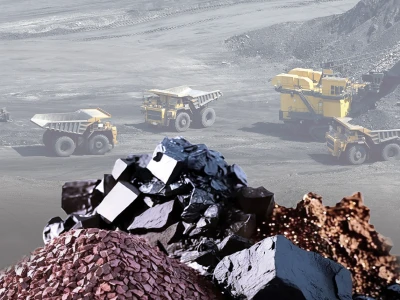The global mining industry is undergoing a profound transformation driven by digital innovations and the increasing adoption of B2B marketplaces. Traditional trading methods are evolving as more companies move towards digital platforms to streamline supply chains, improve transparency, and connect with a broader network of buyers and suppliers. This article explores the trends and innovations shaping the future of B2B mining marketplaces and their benefits for the mining industry.
The Rise of Digital Marketplaces in Mining
With the advent of digital transformation, B2B mining marketplaces have become pivotal for industries seeking efficiency and scalability. Mining companies are utilizing digital platforms to facilitate sourcing, sales, and distribution of mineral resources. These platforms act as a "one-stop shop," allowing companies to connect, negotiate, and transact with a global audience, thereby enhancing market reach and operational efficiency.
Key Trends Shaping the Future of B2B Mining Marketplaces

Automation and AI Integration
AI and machine learning are pivotal in automating processes within B2B mining marketplaces. From inventory management to demand forecasting, AI helps companies optimize their operations and make data-driven decisions, ultimately increasing overall efficiency. AI-driven chatbots and customer support solutions also simplify communications, providing real-time services to users.
Read more: artificial intelligence applications in mining
Blockchain for Transparency and Trust
Transparency is essential in mining, especially regarding the authenticity and provenance of materials. Blockchain technology is being implemented in B2B mining services platforms to ensure traceability of minerals from extraction to delivery. This level of transparency helps companies verify the authenticity of their products and fosters trust among buyers, suppliers, and regulatory bodies.
Data Analytics and Market Insights
Advanced data analytics tools are becoming indispensable for mining marketplaces, offering real-time insights into market trends, price fluctuations, and demand patterns. By analyzing this data, companies can make informed decisions, adjust strategies, and respond swiftly to market changes—a valuable capability in a volatile industry like mining.
Sustainable and Eco-Friendly Practices
With growing awareness of environmental impacts, sustainability has become a core focus of the mining industry. B2B marketplaces are now prioritizing eco-friendly practices, green suppliers, and sustainable sourcing. Digital platforms enable buyers to evaluate suppliers' compliance with environmental regulations, helping to reduce the overall carbon footprint of the industry.
Enhanced Security and Risk Management
Cybersecurity remains a major concern for digital marketplaces, especially in industries dealing with high-value transactions. Advanced security measures, such as multi-factor authentication, encrypted transactions, and secure communication channels, have been implemented to protect sensitive data. Risk management tools are also available to evaluate the credibility of buyers and suppliers, reducing fraud and transaction risks.
Improved User Experience with Mobile-Friendly Platforms
With the increase in mobile use, B2B mining marketplaces are optimizing platforms for mobile devices, providing access anytime, anywhere. Mobile-friendly interfaces enhance the user experience, allowing users to access various marketplace features such as order tracking, messaging, and notifications, which is crucial for operations in remote mining locations.
Benefits of B2B Marketplaces for the Mining Industry

Cost Efficiency and Reduction of Overhead Costs
By streamlining procurement and sales processes, B2B marketplaces reduce transaction costs and eliminate intermediaries, allowing companies to maximize profitability. Digital platforms also enable companies to manage inventory more effectively, minimize waste, and optimize resource allocation.
Global Reach and Market Expansion
Digital marketplaces provide mining companies with access to a global network of buyers and suppliers, extending their reach beyond local markets. This international exposure allows companies to explore new business opportunities, diversify their customer base, and mitigate risks associated with market fluctuations.
Enhanced Decision-Making with Data-Driven Insights
The integration of data analytics offers companies actionable insights into market trends, enabling better decision-making. Mining companies can identify demand patterns, monitor competitor activities, and adapt their strategies to remain competitive in an ever-changing environment.
Improved Compliance and Sustainability
Adhering to regulatory standards and environmental policies is crucial for the mining industry. B2B marketplaces help companies comply with these requirements by providing tools to track sourcing practices and environmental impacts, contributing to a more sustainable industry.
Conclusion
The future of B2B mining marketplaces is filled with potential as technology continues to evolve, creating new opportunities for efficiency, transparency, and global connectivity. By embracing trends like AI, blockchain, IoT, and virtual reality, B2B platforms are poised to transform the mining industry, making it more sustainable, resilient, and adaptable. Platforms like b2bmineral.com are at the forefront of this transformation, offering comprehensive services to meet the diverse needs of the mining sector and empowering companies to succeed in a highly competitive global market.
B2B Mineral platform, as a pioneer in B2B mining marketplaces, provides a specialized environment for the global mining and mineral industry, facilitating connections between miners, producers, and customers internationally. With a focus on the unique needs of the mining sector, this platform offers a secure and user-friendly digital environment that simplifies and enhances the transparency of transactions, contributing to a sustainable and efficient future for the industry











.j_s_thumb.webp)
